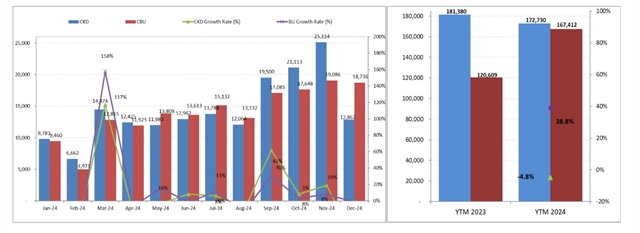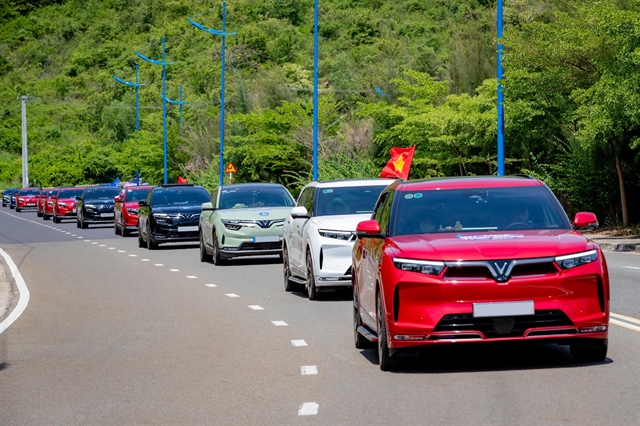VinFast's remarkable performance in the domestic car market in 2024 underscores its dominance, particularly in the electric vehicle (EV) segment.

HÀ NỘI — The Vietnamese car market has crossed a significant milestone in 2024, with estimated total sales exceeding 510,000 vehicles, approaching the record 520,000 vehicles sold in 2022. This growth highlights a pivotal shift, with VinFast leading the transition to electrification and contributing significantly to these figures.
The 2024 automobile market in Việt Nam saw distinct trends influenced by the preferential registration tax policy for domestically assembled vehicles, which created a mixed performance across different market segments.
VinFast's remarkable performance in the domestic car market in 2024 underscores its dominance, particularly in the electric vehicle (EV) segment.
The period between April and September, during which sales of domestically assembled vehicles slowed, provided an opportunity for imported vehicles to gain momentum. However, VinFast's strong sales recovery in the latter months of the year stands as a testament to its growing market appeal and strategic positioning.
VinFast’s total domestic deliveries for the year exceeded 87,000 cars.
These achievements solidify VinFast's status as the leading automotive brand in Việt Nam, surpassing its sales targets and outperforming competitors in both the electric vehicle and overall automotive sectors.

Meanwhile, TC Motor Company said that in 2024, it sold 67,168 Hyundai cars.
According to a report from the Vietnam Automobile Manufacturers Association (VAMA), in December 2024, total market sales reached 31,598 vehicles, down 29 per cent against November 2024 and down 18 per cent compared to the same period in December 2023.
The disappointing sales numbers in December 2024 could be attributed to a policy reducing registration fees by 50 per cent that expired at the end of November. However, the overall growth in cumulative sales reported by VAMA is still notable, with 340,142 vehicles sold in 2024 - a 12.6 per cent increase compared to 2023.
This growth reflects the resilience and adaptability of businesses in a challenging year. The success was largely driven by targeted incentive programmes and promotional campaigns, especially from September to November. Such efforts have not only helped stimulate demand but also reinforced confidence in Việt Nam’s automotive market, setting a positive tone for 2025 despite fluctuating monthly results.
The Vietnamese automobile market has seen remarkable growth, previously achieving over 500,000 vehicle sales in 2022. This milestone signifies a pivotal moment in the industry's development, setting the stage for an electrified future.
As we look to 2024, the trend toward environmentally friendly vehicles is becoming increasingly evident. The market is not only expanding with VinFast's electric vehicle lineup but is also welcoming hybrid options from established Japanese brands like Toyota, Honda and Suzuki.
Moreover, the emergence of Chinese new energy vehicle brands such as BYD, Haval, MG, GAC Aion and Wuling further enriches the market, offering consumers a wider range of choices in the pure electric vehicle segment.
This shift towards electrification and sustainability marks a transformative era for the Vietnamese automobile industry, indicating strong growth potential and a commitment to environmentally friendly transportation solutions.
The Vietnamese electric vehicle market is poised for significant growth in 2024, with VinFast leading the charge. This momentum is crucial as the industry anticipates further advancements in 2025, heralding a new era dominated by electrification.
Car experts predict that the shift towards electric vehicles will reshape the market landscape. To sustain this growth and set new sales records, several strategies must be implemented.
The Government should introduce and enhance policies that promote localisation. This will help boost domestic production and reduce reliance on imported vehicles. Increasing the competitiveness of local enterprises against foreign imports is essential. This could involve incentives for local manufacturers, as well as investment in technology and infrastructure.
Car manufacturers also need to develop systematic approaches to create favourable and promotional policies. These strategies should aim to stimulate consumer demand and make electric vehicles more accessible and appealing. By focusing on these areas, the local automobile market can maintain its upward trajectory and successfully transition into a more electrified future. — VNS





